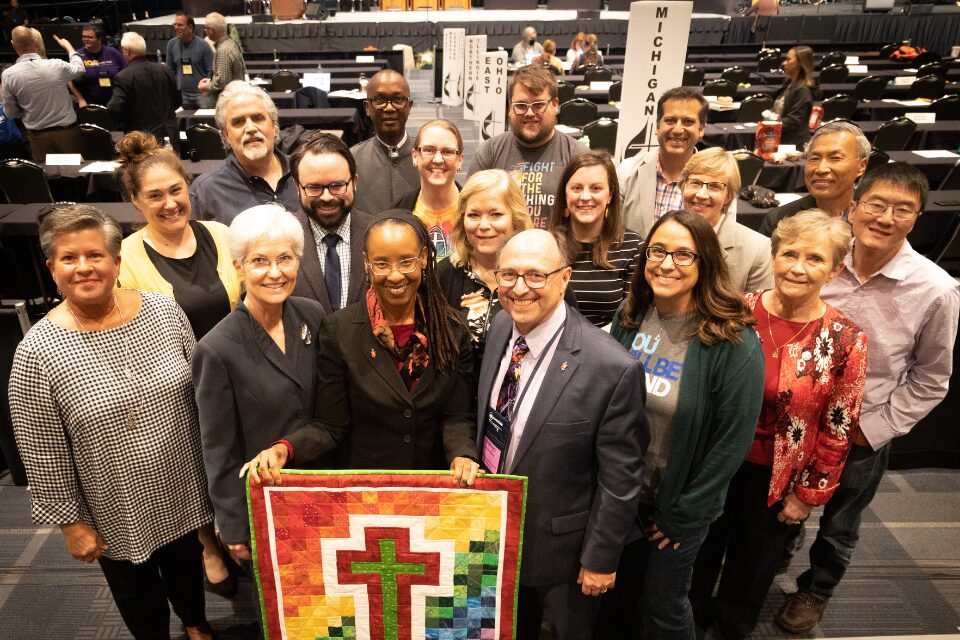This week, we meet four more General Conference delegates as they prepare for the big denominational gathering in Charlotte.
JAMES DEATON
Content Editor
In two previous articles, we’ve been reintroduced to eight of our Michigan Conference delegates (click to read) to the upcoming General Conference in Charlotte, NC, which begins on April 23.
This week, we meet Ruby Anderson, Rev. Brad Bartelmay, Laura Witkowski, and Rev. Christina Wright.
Ruby Anderson
Current ministry role in the Michigan Conference: Ruby is a lay member of Scott Memorial UMC in Detroit. She serves as the lay leader for the Greater Detroit District and is on the United Women in Faith national board of directors.
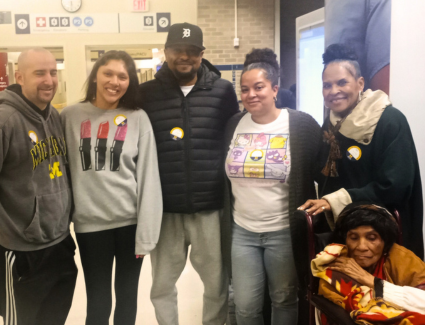
Previous experience as a delegate: Ruby served as a reserve delegate at the 2016 General Conference and the special 2019 General Conference, in addition to being a voting delegate at the North Central Jurisdictional Conferences since 2016.
What legislative committee have you been assigned to, and how are you educating yourself about the matters you’ll be discussing?
“I’ve attended a couple of workshops recently on Church and Society 2 to help guide us toward what we may hear and do at General Conference. Our groups from the North Central Jurisdiction were together recently, and we talked about the issues that fall under this legislative committee.”
A lot has changed since the pandemic postponed General Conference from its original date to now. Describe your thoughts and feelings about this moment we’re in as the Church.
“I pray that this year’s General Conference does not end up like the special 2019 General Conference. I hope that the Church, under the leadership of God, will not be overwhelmed so much by personal judgments about people and that we can honor and love one another. That may be a simple way of saying it, but I believe in loving the Lord your God with all your heart and loving your neighbor as yourself. I honor that scripture, which is my goal whether I do it as well as I want to.”
What continues to motivate you and inspire you to serve in this capacity as a delegate and a member of The United Methodist Church?
“I pray for the things that I do in ministry. So, when I ran to be a General Conference delegate, I told God I would serve where he allowed me to serve. What encourages me is my commitment. I prayed about it, and I want to serve the term and understand our Church and what we’re doing. I want to be informed. And I’m committed to sharing what we’re learning with others.”
Which General Conference legislative items are most important for Michigan United Methodists to pay attention to? Why are they important, and how might they impact us and our ministry?
“The Social Principles are being revised, and we’re considering some language changes related to gender that would be helpful to the world. I hope the issues surrounding these changes will be resolved peacefully for our Church.
“Because I’m part of United Women in Faith, I hope the petitions related to children, especially those protecting the girl child, will be prioritized and passed. Children are valuable, and we must concentrate on what matters to them.”
How can the Michigan Conference pray for and support you as a delegate?
“It’s very important that the conference knows we are going and that we are called to learn and serve. I want the Church to pray. And I think all churches across Michigan should pray for their delegates at the altar and whenever they can as we prepare to go to Charlotte and deliberate for our Church.”
Rev. Brad Bartelmay
Current ministry role in the Michigan Conference: Brad is a retired minister who has been serving as the special assistant to the bishop for nine months, shepherding churches through the disaffiliation process.
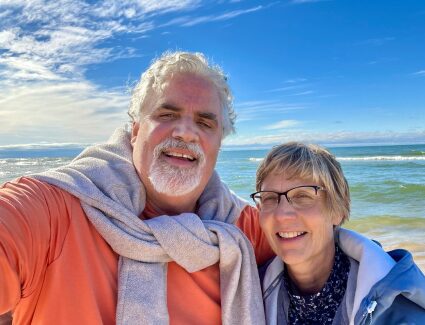
Previous experience as a delegate: This is the first time Brad has served as a General Conference delegate.
What legislative committee have you been assigned to, and how are you educating yourself about the matters you’ll be discussing?
“I am a resource person supporting the delegates regarding financial and budgetary legislation. I’ve been reading and learning about the legislation. In this area, the focus will be on the steep budget cuts The United Methodist Church will face considering the dramatic decline in membership/worship attendance in recent years.”
A lot has changed since the pandemic postponed General Conference from its original date to now. Describe your thoughts and feelings about this moment we’re in as the Church.
“It’s hard to overestimate the impact of the COVID-19 pandemic and disaffiliation on The United Methodist Church. Since 2019, 31% of our churches in the United States have disaffiliated or closed for one reason or another. We United Methodists need to accept that the status quo no longer works. I hope that United Methodists at all levels, from General Conference to the local church, will see this time as an opportunity for experimentation and prayer as the Church, by God’s grace, defines what it will be going forward.”
What continues to motivate you and inspire you to serve in this capacity as a delegate and a member of The United Methodist Church?
“The opportunity to participate in change which will lead the Church to become more and more the beloved community it is called to be.”
Which General Conference legislative items are most important for Michigan United Methodists to pay attention to? Why are they important, and how might they impact us and our ministry?
“Regionalization. This legislation will open the door for greater flexibility for how North American United Methodists structure their work and identify their values. This could be a key component in unlocking renewal for our denomination.
“In addition to regionalization, I will be interested in watching the legislation regarding language about human sexuality in the Book of Discipline. I’m praying for changes in this restrictive language.
“I’d encourage Michigan United Methodists to pay attention to the budget as well since this will impact Ministry Share rates for their local churches.”
How can the Michigan Conference pray for and support you as a delegate?
“Pray not only for our spiritual well-being but also for our physical well-being. The schedule looks to be exhausting.”
Laura Witkowski
Current ministry role in the Michigan Conference: Laura is a lay member of Aldersgate UMC in Grand Rapids. At the conference level, she serves as Associate Director for Connectional Ministries and is the team lead for the Connectional Ministries Team.
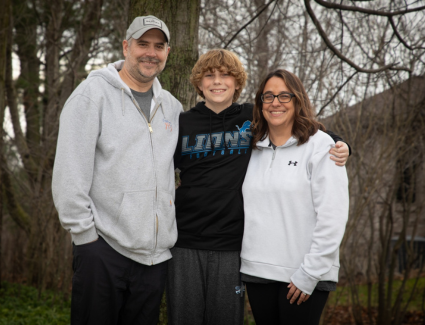
Previous experience as a delegate: Laura is the co-chair for the Michigan Conference’s delegation. Previously, Laura was a reserve delegate at the 2016 General Conference and the special 2019 General Conference, as well as a voting delegate at the North Central Jurisdictional Conferences since 2016.
What legislative committee have you been assigned to, and how are you educating yourself about the matters you’ll be discussing?
I have been assigned to the Faith and Order Legislative Committee. Many across the connection on the committee have already started meeting and discussing. As a first-time primary delegate, I’ve learned a lot about the intricacies of reading legislation. Understanding the overlaps between petitions in other legislative committees has been helpful. Contextualizing each petition within the framework of the Book of Discipline has provided valuable insights. Also, considering diverse perspectives on each petition has been a key part of my preparation.
“A significant item my committee is reviewing is “Sent in Love: A United Methodist Understanding of the Church.” This document came from a request by the Council of Bishops to create a new theological teaching document on ecclesiology, the understanding of the Church itself. The document, rooted in scripture, Wesleyan heritage, and ecumenical dialogue, results from feedback received from various United Methodist members and groups. It is intended to complement two existing theological statements, “By Water and the Spirit” and “This Holy Mystery,” and address contemporary challenges. The idea is that it will serve as a resource for The United Methodist Church globally, aiding in theological reflection, education, and dialogue within and beyond the Church.”
A lot has changed since the pandemic postponed General Conference from its original date to now. Describe your thoughts and feelings about this moment we’re in as the Church.
“There is no way I could have ever predicted this is where we would be today when elected in 2019. My feelings about the journey and the moment the Church is in vary by the day. I remain convinced that The United Methodist Church still has something worthwhile to offer that is unique to us. As a fourth-generation Methodist, I feel it is important that it continues since this denomination and its predecessors have impacted my life.”
What continues to motivate you and inspire you to serve in this capacity as a delegate and a member of The United Methodist Church?
“My commitment to do what I said I would do drives me forward. The parallel to Esther’s ‘for such a time as this’ aspect feels deeply resonant. The opportunity to serve in this way might not have made sense for me years ago and may not be possible in the future. I feel that God, the people who elected me, and those who have influenced my faith and leadership throughout my life have all played a role in preparing me.
“Recently, I watched the 100th Anniversary Celebration of Social Witness and the United Methodist Building on Capitol Hill in Washington, DC. Dr. Ashley Boggan, the General Secretary of the United Methodist Commission on Archives and History, provided a historical perspective that was really inspiring. Her reflections reminded me of the significant impact we, the people of God and United Methodists, have had throughout history. Dr. Boggan highlighted how the Methodist women of the nineteenth century ‘knew that their Methodist faith would not let them sit idly by and watch the world around them suffer.’ The legacy of women who came before continues to inspire me.”
Which General Conference legislative items are most important for Michigan United Methodists to pay attention to? Why are they important, and how might they impact us and our ministry?
“An important piece for me and so many in the Michigan Conference is removing harmful language related to LGBTQ+ persons from the Book of Discipline. I have seen the unnecessary pain and profound harm inflicted on countless remarkable pastors, laypersons, friends, and family by those words. It is time to remove that language.
“Regardless of the outcomes of General Conference, the Michigan Conference has affirmed our commitment to the inclusion of all persons, and we shouldn’t deviate from that now.”
How can the Michigan Conference pray for and support you as a delegate?
“Pray for all attending General Conference, not just the Michigan Delegation. Pray for courage, especially when we feel tired and overwhelmed, that we persevere in the good work we are called to do. Pray for discernment, that we may hear God’s voice in every person who speaks at General Conference. Messages of encouragement and love are welcome. Personally, I am always happy to receive chocolate and gummy bears, too!
Rev. Christina Wright
Current ministry role in the Michigan Conference: Christina is an ordained deacon serving as the Associate Director of Spiritual Care at Michigan Medicine. She began as a chaplain but then transitioned to this new role where she views herself as a chaplain to the chaplains.
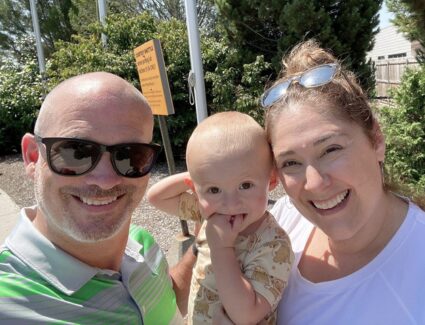
Previous experience as a delegate: Although Christina has attended every General Conference since 2004 as a volunteer and advocate, this is her first time serving as a delegate. She is a reserve clergy delegate for this year’s General Conference and a voting delegate for the North Central Jurisdictional Conference.
What legislative committee have you been assigned to, and how are you educating yourself about the matters you’ll be discussing?
“As a reserve, I’m not in a legislative committee. I am reading up on Independent Commissions for our delegation, though.”
A lot has changed since the pandemic postponed General Conference from its original date to now. Describe your thoughts and feelings about this moment we’re in as the Church.
“It is easy to get discouraged by many things both in the Church and in the larger world right now. While I have been involved in the general church for two decades, I have recently leaned more into the difference we can make locally and not rely on General Conference to speak for us and do our work. I think a lot about how we live out the mission of the Church in our daily lives, in our local churches and communities, and even in the Michigan Conference. I find a lot to be excited about in these areas that are more within our control. At the same time, I choose to remain in The United Methodist Church and value our connectional nature. Even when we do great work locally, I am aware of our denominational voice and our message’s impact.”
“I don’t believe the current structure of the church is tenable. My first General Conference in 2004 demonstrated that to me, even 20 years ago. I think we are seeing that structure break, whether we want it to or not, and I don’t believe this is just an issue of sexual orientation but rather how we think about working together coming from different cultures, languages, governments, economies, worldviews and not prioritizing one particular angle. For example, while I can access the Daily Christian Advocate online to see the resolutions we will be voting on, many delegates without reliable Internet access have yet to see these or even be assigned to legislative committees. So, while some of us have been poring over these resolutions, brainstorming, and praying about what lies ahead, others may have minimal knowledge of or voice in these conversations until days before General Conference. So, how do we function as a global body in a manner that isn’t patriarchal and doesn’t prioritize the US experience and minimize all others? And how do we do that in a structure that is exceedingly difficult to change based on our rules? I’m unsure what will happen, and I doubt it will be solved quickly, but I do think it may require us to step out of our usual ways of thinking and being together to allow the creativity of the Spirit to work, and I look forward to seeing how that may evolve.”
What continues to motivate you and inspire you to serve in this capacity as a delegate and a member of The United Methodist Church?
“It is easy to get discouraged with all the delays and difficulties. My life looks very different than when I was elected in 2019. I’ve gotten married, had a child, lost a parent, survived a global pandemic, and all the other sorts of things five years of life brings. Amid these changes, I remain committed to healing the wounds we, as individuals and as a Church, have caused. I am committed to the mission of The United Methodist Church. And I am committed to creating the spaces, both in small and large contexts, for the power of the Holy Spirit to be unleashed in the liberating ways that free us from the chains that hold us down.”
Which General Conference legislative items are most important for Michigan United Methodists to pay attention to? Why are they important, and how might they impact us and our ministry?
“I don’t have a clear answer for this. Of course, I’m concerned with the big structural issues, and at times, the other issues can feel irrelevant unless we figure those out first. But I also think various important things are coming before us. Because of my membership on the Michigan Conference’s Board of Ordained Ministry and seeing the strengths and growing areas for our ordination process, I’m very interested in proposals related to changing our process.
“Of course, I want all of us to pay attention to General Conference, but I also want us to remember that what we do locally matters a lot. I certainly recommend watching discussions on the denomination’s structure and how much room there is for variation.”
How can the Michigan Conference pray for and support you as a delegate?
“I welcome prayers for wisdom, courage, and energy for the long days and heavy work!”
Last Updated on April 15, 2024

